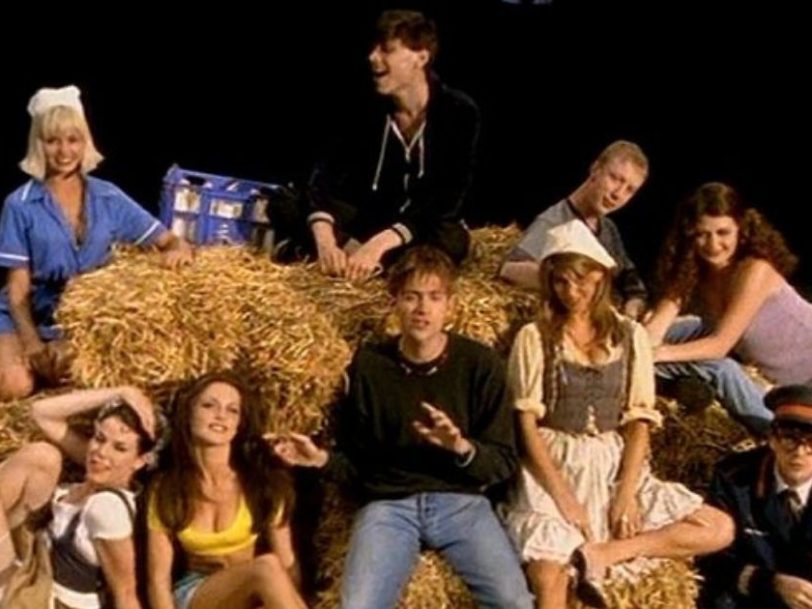With The Great Escape due for release in September, Country House was scheduled to kick off the promotional campaign at the end of August. A line of back-room communication between the Blur and Oasis camps had previously been established to ensure the groups gave each other a wide enough berth that either could release something without competition, but when Blur’s team found out that Oasis had planned to issue their new single, Roll With It, a lot earlier than anticipated – just a week before Country House – Blur had to decide whether to risk being overshadowed by their chart rivals, or to move their release date forward and directly compete with Oasis for the No.1 spot.
“The thing is, a No.1 record tends to have a better-than-evens chance of being one the week after, just because it’s on Top Of The Pops, and all the kids hear it,” Food Records co-founder Andy Ross told John Harris for his Britpop history The Last Party. Having moved with Food to Parlophone, Ross continued to oversee Blur’s affairs, and recounted the dilemma they faced: “Had Oasis released their single before Blur, they would have had a No.1, and by that logic, they would have had an extremely good chance of staying there the next week, even if Blur had a good crack at it.”
Oasis’ previous single, Some Might Say, had already taken them to the top of the charts, and Albarn was still bothered by the way frontman Liam Gallagher had greeted him at the celebration party, held at the Mars Bar club in Soho, London. “As I went in Liam was at the door and he came over to me, right in my face, going, ‘Number fucking one, mate.’ Good luck to them, you know, they’d got the first No.1, but there was something weird about this naked ambition in his eyes.”
What had began as a relatively harmless rivalry, which also had Gallagher calling Blur’s output “Chas And Dave chimney-sweeping music”, had begun to intensify. “Noel [Gallagher, Oasis guitarist and Liam’s brother] chose to kind of take the piss out of me constantly,” Albarn reflected in No Distance Left To Run. “And it’s OK. But it really hurt me at the time, and I felt very, very vulnerable.” At a meeting at the Westmoreland Arms pub, near Food Records’ office, he decided that the only option was to go for broke and release Country House on the same day as Roll With It. “Oasis, in many ways, were kind of like the bullies that I had to put up with at school anyway,” Albarn later said of his decision. “They gave the impression that they’d been in a lot more fights than you, and I suppose it just came down to that.”
The video: “The product of an ironic mindset, but… it was all too easy to take it at face value”
To promote Country House, Blur hired Damien Hirst, then spearheading the Young British Artists movement of the mid-90s, to film a promo video which featured actor Keith Allen in the David Balfe-inspired role, and the band hamming it up on an oversized board game named Escape From The Rat Race. Nods to Queen’s Bohemian Rhapsody video were thrown in as a send-up of Blur’s own vocal harmonies, but a debt to Benny Hill’s 70s humour – what Alex James called “the language of breasts and bottoms” – stuck more firmly in the public consciousness.
“Most of Blur’s videos in the 90s tried to make a statement, to offer a markedly different atmosphere from the majority of promos that were popping up on MTV at the time,” guitarist Graham Coxon wrote in his memoir, Verse, Chorus, Monster! “Country House… was the product of an ironic mindset, but already things had changed so much – both within the band and in the wider culture – that it was all too easy to take it at face value.” As Damon Albarn and Alex James cavorted with Page 3 models including Jo Guest, Coxon reluctantly agreed to drive a Benny Hill-like milk float around the set.
The release: “I just wanted a really decent No.1 without the BS”
In the era of the multi-format single release, on 14 August 1995 Blur issued Country House on two different CDs, a 7” and a cassette, across which were spread B-sides including a brand-new song, One Born Every Minute, plus performances from the summer’s Mile End gig and a French-language re-recording of Parklife’s To The End, with Parisian icon Françoise Hardy. As the release date drew near, the press ran increasingly hysterical stories about the Blur-Oasis feud, fanning the flames of what had been dubbed the “Battle Of Britpop”. But as one NME cover pitted Albarn and Liam Gallagher against each other in the “British Heavyweight Championship”, Alex James asserted that the moment was something both groups should have been allowed to call a victory: “I think they’re a great band and that this is the defining Britpop moment,” he said at the time, adding: “It’s not Blur versus Oasis, it’s Blur and Oasis against the world.”




